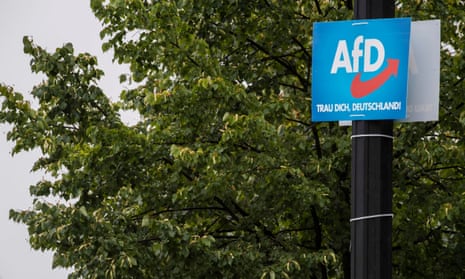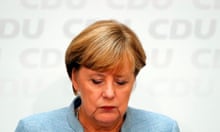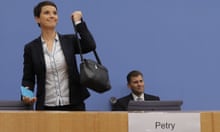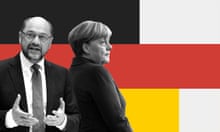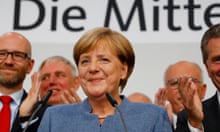Germany is bracing itself for a watershed moment in its postwar history, with an overtly nationalist party is set to emphatically enter the country’s parliament for the first time in almost six decades.
Rightwing populist Alternative für Deutschland has strengthened its upward trajectory in the last week before the vote, with two polls published on Friday showing the party on third place.
Founded just four years ago as an anti-euro force, the AfD is polling on between 11% and 13%, with Angela Merkel’s conservative bloc and the Social Democrats dropping percentage points while the Left party slipped into fourth place.
According to polls by respected institutes INSA and Enmid on Friday, Merkel’s CDU/CSU alliance was on between 34% to 36% and the SPD on between 21% and 22%. Die Linke was polling at between 10% and 11%, the pro-business Liberal Democrats on 9% and the Greens had crept up to 8%.
The results would pave the way for the continuation of a grand coalition between the CDU/CSU and the SPD or a so-called Jamaica Coalition between Merkel’s conservatives and the FDP and Greens, never before seen on the national stage.
AfD leaders have urged their members to act as election observers, keeping a close eye on the voting process amid mounting suspicions within the party that their results might be manipulated, citing the threat the party posed to the established parties.
The AfD, under their top candidates Alice Weidel, a 38-year-old management consultant – who has made much of her same-sex relationship in recent days – and Alexander Gauland, a 76-year-old German nationalist with strong anglophile leanings, have made considerable strides over the course of the campaign in spite of a rightward lurch in its rhetoric criticised even by the party’s leader.
Vowing in its manifesto to ban all mosques and minarets, prohibit Muslim calls to prayer and criminalise people wearing the veil, the AfD has also called for a change in attitude to Germany’s historic crimes in the second world war.
If polls are accurate, the AfD is expected to garner between 60 and 85 parliamentary seats, and would become the largest opposition group in parliament if Merkel’s conservative alliance and the SPD agreed to continue their coalition.
Among the entitlements it would receive as a result would be the influential chair of the budget committee as well as top positions on the committees of everything from the broadcasting council to the parliamentary assembly of the European council, as well as the right to be sent to meetings of international organisations such as Nato or the United Nations as representatives of the Bundestag.

Created four years ago in protest at the eurozone bailout of Greece by a group of academics bankers and economists, the AfD already appeared to be a spent force by 2015. But Merkel’s decision that same year to allow more than 1 million refugees to enter Germany reanimated the party. Amid fears over inner German security, its popularity soared as it responded with demands to restrict asylum rights and to seal Germany’s borders and developed a strong anti-Islamic rhetoric.
It is currently represented in 13 of 16 regional parliaments.
With around a third of voters still undecided as to how they will vote, some pollsters have warned that the AfD’s result could be even higher than 13%, referring to those voters, some distrustful of pollsters, who either refuse to divulge their voting preferences or choose to lie about them. Polling institutes have previously underestimated support for the AfD most significantly in Saxony Anhalt, where ahead of regional elections last year they were predicted to get 18% but ended up with 24%.
A poll by the tabloid Bild said that almost 40% of Germans believe the party could do better than predicted.
The AfD has continued to go from strength to strength despite a series of scandals.
Gauland prompted outrage when he said Germans had the right to be proud of its soldiers in both world wars, a statement that completely contravenes a consensus in German politics to not condone anything to do with Germany’s role in the war.
He also said the government’s commissioner for integration, Aydan Özoguz, who has Turkish roots, should be “disposed of in Anatolia”.
Then came an email written by Weidel in 2013 which was published in the German press in which she described the government as pigs, calling them “nothing other than puppets of the victorious powers of the second world war, tasked with keeping the German people down.” Having initially denied its authenticity, Weidel’s lawyer has stopped suggesting it was a fake.
At a final press conference earlier this week, Gauland and Weidel pledged to shake up the Bundestag by introducing a far more argumentative tone, insisting that the prevailing mood of consent had greatly damaged German democracy. They also said they would pursue their attempts to have Angela Merkel prosecuted for breaking the law over her open door refugee policy. “It is imperative that we define the political background in the Bundestag so that we can come to a clear legal solution,” Gauland said.
Even the AfD’s head, Frauke Petry, once considered a firebrand in her own right but who has since been greatly marginalised, criticised her colleagues and sought to distance herself from them, saying they were putting off many middle class voters. “I can understand why they are horrified,” she said.
On Thursday, Peter Altmaier, Merkel’s chief of staff urged voters to stay at home rather than vote for the AfD, prompting a strong backlash from other politicians who called his remarks defeatist.
“Pleading with people to abstain from participating in the parliamentary elections amounts to a capitulation of the Christian Democrats before the rightwing populists,” Sigmar Gabriel, the foreign minister and leading Social Democrat said.
The last party with strong far-right tendencies to sit in the Bundestag was the Deutsche Partei, which was part of Konrad Adenauer’s coalition government until 1960. It dissolved as a national force in 1961 but continued at a regional level until 1980.
- This article was amended on 23 September 2017 to correct the time reference in the headline, and to make clear that there is a consensus in German politics to not condone anything to do with Germany’s role in the war.
